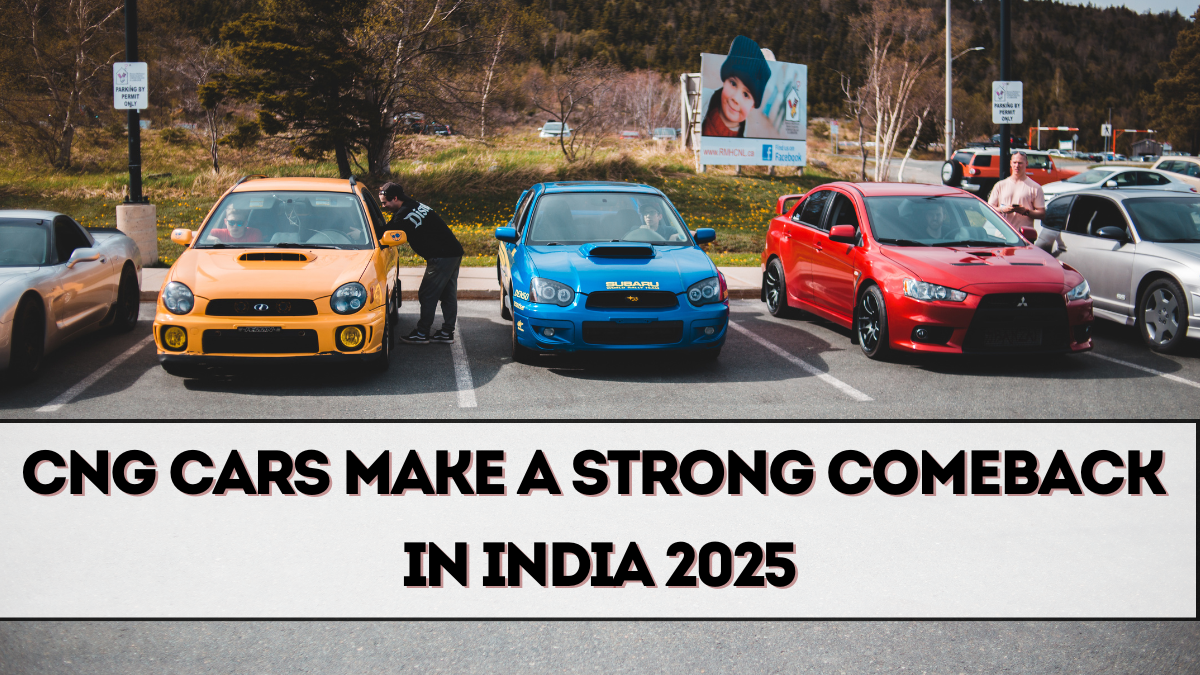In September 2025, India’s auto market is witnessing a resurgence of CNG-powered vehicles. Once considered a niche category, CNG cars are now becoming mainstream again as buyers seek affordable, fuel-efficient, and eco-friendly alternatives to petrol and diesel.
This revival is being driven by rising fuel costs, expanding CNG infrastructure, and policy support, making CNG cars a practical choice for families and commuters.

Why CNG Cars Are Back in Demand
Several reasons explain the renewed popularity of CNG vehicles.
-
Petrol and diesel prices continue to rise, making daily running costs higher.
-
CNG offers lower cost per kilometer, saving buyers significant money.
-
CNG is cleaner than fossil fuels, aligning with India’s green mobility goals.
With these benefits, buyers are once again turning to CNG variants across segments.
Automakers Leading the CNG Revival
Multiple carmakers have embraced the CNG trend in 2025.
-
Maruti Suzuki: Expanded its S-CNG portfolio with models like Baleno, Ertiga, and Swift.
-
Hyundai: Offering CNG variants of Grand i10 Nios, Aura, and Venue.
-
Tata Motors: Entered the market with CNG versions of Tiago and Tigor.
-
Toyota: Introducing CNG options in budget-friendly models.
This wide availability has given buyers plenty of choices.
Expanding CNG Infrastructure
Infrastructure growth is a key factor in the CNG comeback.
-
Over 6,000 CNG stations are now operational across India.
-
New pipelines are being built to ensure wider access in Tier 2 and Tier 3 cities.
-
Automakers are collaborating with oil companies to expand CNG refueling networks.
This ensures CNG cars are no longer limited to metros—they are viable nationwide.
Buyer Sentiment
Buyers are showing renewed trust in CNG cars.
-
Families love the cost savings on daily commutes.
-
Ride-hailing and taxi fleets prefer CNG for high-mileage operations.
-
Environment-conscious professionals see CNG as a transition fuel until EVs dominate.
This positive sentiment has led to record sales in mid-2025.
Cost Advantage
CNG cars are winning buyers with their affordability and efficiency.
-
Running costs are 30–40% lower than petrol cars.
-
Purchase prices remain competitive, with CNG variants costing ₹80,000–1 lakh more than petrol.
-
Buyers recover the extra cost within 1–2 years of ownership.
This makes CNG cars a value-for-money proposition.
Environmental Benefits
CNG cars also support India’s green mobility goals.
-
They emit fewer pollutants compared to petrol and diesel.
-
Lower CO2 emissions make them a cleaner option for cities battling pollution.
-
The government sees CNG as an interim solution until EV infrastructure matures.
This aligns with India’s commitment to reducing carbon footprints.
Challenges for CNG Cars
Despite strong growth, challenges remain.
-
Limited boot space in CNG cars due to storage tanks.
-
Refueling takes longer compared to petrol or diesel.
-
Availability in rural areas is still catching up with demand.
However, automakers are addressing these issues with new tank designs and improved refueling networks.
Analysts’ Views
Industry experts believe CNG cars are here to stay.
-
They bridge the gap between traditional fuel cars and EVs.
-
Affordable pricing makes them ideal for middle-class households.
-
By 2026, CNG vehicles could account for 15–18% of total passenger car sales in India.
Some analysts even call CNG the “comeback fuel of the decade.”
Final Thoughts
The rise of CNG cars in India in 2025 shows how buyer preferences are shifting toward affordable and eco-friendly mobility solutions.
With strong automaker support, expanding infrastructure, and government backing, CNG cars are no longer a niche—they are part of India’s mainstream auto market.
For buyers, this means a chance to save money and reduce emissions. For automakers, it is an opportunity to dominate a fast-growing segment while preparing for the EV transition.
FAQs
Why are CNG cars making a comeback in 2025?
Because they offer lower running costs, eco-friendly performance, and strong policy support.
Which automakers lead the CNG car market?
Maruti Suzuki, Hyundai, Tata Motors, and Toyota are leading the CNG revival.
How much cheaper is CNG compared to petrol?
Running costs are 30–40% lower, saving thousands annually.
Are CNG cars available across India?
Yes, with over 6,000 CNG stations, coverage is rapidly expanding nationwide.
Will CNG cars compete with EVs?
Yes, they act as a transition solution until EV adoption becomes widespread.
Click here to know more.
